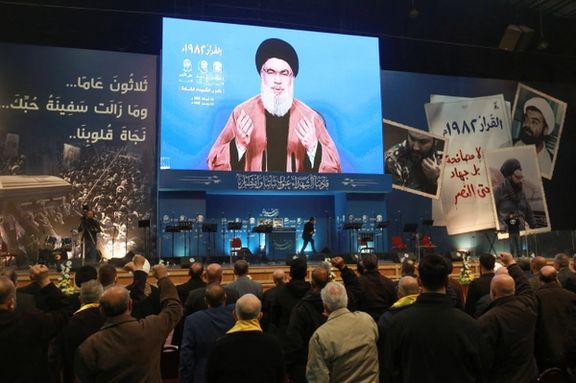US Nuclear Deal Opponents Turn Fire On Iran's Regional Proxies

The Washington Free Beacon reports a draft law requiring the US government to explain how sanctions relief would affect Tehran’s dealings with Hamas and Hezbollah.

The Washington Free Beacon reports a draft law requiring the US government to explain how sanctions relief would affect Tehran’s dealings with Hamas and Hezbollah.
In the latest attack on efforts to revive the 2015 Iran nuclear deal, the JCPOA (Joint Comprehensive Plan of Action), House representatives Ronny Jackson, a Republican, and Stephanie Murphy, a Democrat, and 19 others called the Palestinian and Lebanese militant groups “Iranian proxies…waging operations against Israel.”
The Beacon reported that the “coalition of lawmakers are concerned that sanctions relief for Iran will embolden both terror groups and lead to an increase in terror strikes on Israel, which saw a wave of attacks that killed 11 citizens in the last two weeks.”
Two of these three attacks were carried out by ‘Israeli Arabs,’ Palestinians with Israeli citizenship, and one by a Palestinian from the occupied West Bank. While none was linked to the groups cited by the US legislation, Israeli has gone onto security alert fearing a repetition of last year’s ethnic clashes.
However, both Hezbollah and Hamas have praised the attacks as operations of “martyrdom” and both have long track records of organizing and carrying out attacks against Israeli civilians.
The Beacon quoted Jackson that “the United States cannot afford to ignore the threat posed by Iran-backed proxies.” It reported that AIPAC, the American Public Affairs Committee, was backing the bill, which would also require the Defense Department to report to Congress on other “Iran-backed entities,” including the Popular Front for the Liberation of Palestine, the Badr Organization (which is Iraqi), and Yemen’s Ansar Allah, widely known as the Houthis.
Unfrozen funds
The Beacon claimed that a provision in the bill that federal funds not “bolster…the listed terror groups” could “interfere with the Biden administration’s efforts to unfreeze Iranian funds that may be funneled to its proxy groups.”
Restoring the JCPOA, under discussion in Vienna for a year, would require the US lifting ‘maximum pressure’ sanctions levied by the Trump administration in 2018 on leaving the JCPOA. These threaten punitive action against third parties dealing with Iran’s financial sector or buying its oil, leaving billions owed Iran ‘frozen’ by banks wary of US action, especially in Asia.
While some argue that President Joe Biden requires Congressional support for JCPOA revival no more than Trump did for leaving it, Representative Michael McCaul, the lead Republican on the House Foreign Affairs Committee, told the Beacon he was hopeful eight Democrats would vote with the Republicans opposing the JCPOA.
State Department spokesman Ned Price on Friday repeated the administration’s arguments that Trump’s sanctions were ineffective in moderating Iran’s behavior, saying that Tehran-inspired attacks on US and its allies increased after 2018. While his claim about attacks on US interests is true, Iran was embroiled in the Syrian civil war, especially in 2015-2017, fighting to save Bashar al-Assad’s government, and entrenching itself on the Israeli border.
McCaul said that with Congressional mid-term elections due November “if Republicans take the majority, they will move to reimpose sanctions on Iran and nullify the terms of any deal Biden inks.”
The Beacon suggested that “with the ongoing war in Ukraine generating anti-Russia sentiment, provisions in the nuclear deal that empower and enrich Moscow will be a hard sell on Capitol Hill.” Russia and Iran signed an agreement in 2014 over nuclear power at Bushehr, which over the project’s life would see Tehran pay $10 billion.